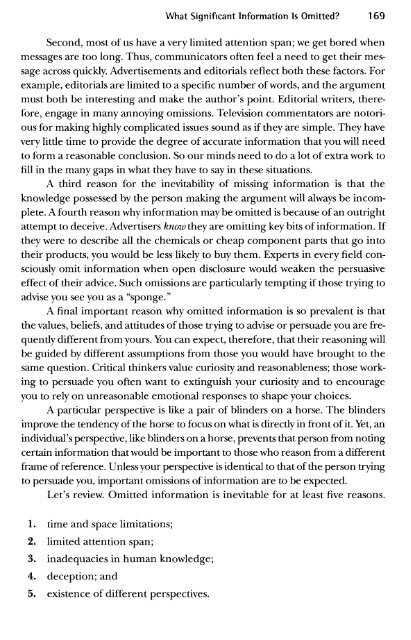Asking the Right Questions, A Guide to Critical Thinking, 8th Ed
Asking the Right Questions, A Guide to Critical Thinking, 8th Ed
Asking the Right Questions, A Guide to Critical Thinking, 8th Ed
You also want an ePaper? Increase the reach of your titles
YUMPU automatically turns print PDFs into web optimized ePapers that Google loves.
What Significant Information Is Omitted? 169<br />
Second, most of us have a very limited attention span; we get bored when<br />
messages are <strong>to</strong>o long. Thus, communica<strong>to</strong>rs often feel a need <strong>to</strong> get <strong>the</strong>ir message<br />
across quickly. Advertisements and edi<strong>to</strong>rials reflect both <strong>the</strong>se fac<strong>to</strong>rs. For<br />
example, edi<strong>to</strong>rials are limited <strong>to</strong> a specific number of words, and <strong>the</strong> argument<br />
must both be interesting and make <strong>the</strong> author's point. <strong>Ed</strong>i<strong>to</strong>rial writers, <strong>the</strong>refore,<br />
engage in many annoying omissions. Television commenta<strong>to</strong>rs are no<strong>to</strong>rious<br />
for making highly complicated issues sound as if <strong>the</strong>y are simple. They have<br />
very little time <strong>to</strong> provide <strong>the</strong> degree of accurate information that you will need<br />
<strong>to</strong> form a reasonable conclusion. So our minds need <strong>to</strong> do a lot of extra work <strong>to</strong><br />
fill in <strong>the</strong> many gaps in what <strong>the</strong>y have <strong>to</strong> say in <strong>the</strong>se situations.<br />
A third reason for <strong>the</strong> inevitability of missing information is that <strong>the</strong><br />
knowledge possessed by <strong>the</strong> person making <strong>the</strong> argument will always be incomplete.<br />
A fourth reason why information may be omitted is because of an outright<br />
attempt <strong>to</strong> deceive. Advertisers know <strong>the</strong>y are omitting key bits of information. If<br />
<strong>the</strong>y were <strong>to</strong> describe all <strong>the</strong> chemicals or cheap component parts that go in<strong>to</strong><br />
<strong>the</strong>ir products, you would be less likely <strong>to</strong> buy <strong>the</strong>m. Experts in every field consciously<br />
omit information when open disclosure would weaken <strong>the</strong> persuasive<br />
effect of <strong>the</strong>ir advice. Such omissions are particularly tempting if those trying <strong>to</strong><br />
advise you see you as a "sponge."<br />
A final important reason why omitted information is so prevalent is that<br />
<strong>the</strong> values, beliefs, and attitudes of those trying <strong>to</strong> advise or persuade you are frequently<br />
different from yours. You can expect, <strong>the</strong>refore, that <strong>the</strong>ir reasoning will<br />
be guided by different assumptions from those you would have brought <strong>to</strong> <strong>the</strong><br />
same question. <strong>Critical</strong> thinkers value curiosity and reasonableness; those working<br />
<strong>to</strong> persuade you often want <strong>to</strong> extinguish your curiosity and <strong>to</strong> encourage<br />
you <strong>to</strong> rely on unreasonable emotional responses <strong>to</strong> shape your choices.<br />
A particular perspective is like a pair of blinders on a horse. The blinders<br />
improve <strong>the</strong> tendency of <strong>the</strong> horse <strong>to</strong> focus on what is directly in front of it. Yet, an<br />
individual's perspective, like blinders on a horse, prevents that person from noting<br />
certain information that would be important <strong>to</strong> those who reason from a different<br />
frame of reference. Unless your perspective is identical <strong>to</strong> that of <strong>the</strong> person trying<br />
<strong>to</strong> persuade you, important omissions of information are <strong>to</strong> be expected.<br />
Let's review. Omitted information is inevitable for at least five reasons.<br />
1. time and space limitations;<br />
2. limited attention span;<br />
3. inadequacies in human knowledge;<br />
4. deception; and<br />
5. existence of different perspectives.



